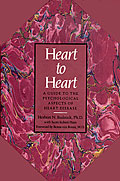When someone close to you suffers from heart disease, the impact can be devastating for the patient, family and friends. Once the medical emergency has passed, a wide spectrum of emotional problems may begin.
Today’s heart disease patient needs to address these issues. If ignored, the patient and other family members alike can become hostage not only to the physical limitations of heart disease, but the emotional limitations as well.
Full cardiac recovery requires both a healthy body and a healthy emotional state, beginning the process of regaining a sense of control over life.
Paperback: 140 pages
Publisher: Health Press (NM) (January 1, 1997)
ISBN: 0-929173-07-4
Book Review by Bettie S. Jackson, Ed.D., MBA, FAAN:
It is interesting experience to go from reading the usual professional journals and books to reading a compact little book written for cardiac patients, their families/significant others and their professional care givers. I was struck by the glaring contrasts in two worlds of concern: the professional and clinical, from the cardiac specialist’s point of view, and the humanistic point of view of the patient and those closest to him.
In Heart to Heart, Herbert N. Budnick, Ph.D., a licensed psychotherapist who works almost exclusively with patients with heart disease and their families, has written a neat little book that should probably be given to every patient upon discharge from the hospital after a cardiac event.
The book contains seven chapters covering, from the patient’s perspective, such themes as “Scared and Confused,” “the Cardiac Spouse,” “Doctors and Nurses,” and “of a Medical Nature.” He addresses questions that patients and their loved ones sometime ask, would like to ask, and surely most often think: Why do I get lost and confused? Can I still maintain my quality of life? Is it ok to have sex? What is hypertension? What exactly does the heart do?
Dr. Budnick, in a calming was, addresses very common concerns, refers patients to their physicians for guidance and answers, and does a great deal to help the patient and his loved ones feel very normal for all of their concerns throughout their crises. He puts considerable emphasis on openness and communication about feelings and sharing. He really understands that issues that emerge at the time of a cardiac event may not be new for the patient and his family, but they are exacerbated and need attention. He uses brief case studies to illustrate how informed support from physician and nurses and in some cases psychotherapists can assist patients and others with the stressors of a cardiac event.
I liked the book a lot. It is relatively easy to read (from patient’s point of view), the print is large enough for anyone over 50 years of age, and it has useful table of contents as well as an index. A brief bibliography and easy to read guide to some cardiac medications is included. I would like to have seen a diagram of the normal heart with chambers, valves and major vessels, along with the diagram of the heart with its coronary vessels that is included. The book costs $22.95 in hardcover. I hope that if it isn’t already, it will be available in paperback at less expense. Physicians and nurses should consider making the book available to their patients and loved ones.
PDF of a Quote from Dan Reeves, Head Coach of the Denver Broncos.
No part of this book and no part of this Website, for that matter, may be reproduced or transmitted in any form or by any means, graphic, electronic, or mechanical, including photocopying, recording, taping or by any information storage or retrieval system, without the permission in writing from the publisher.


